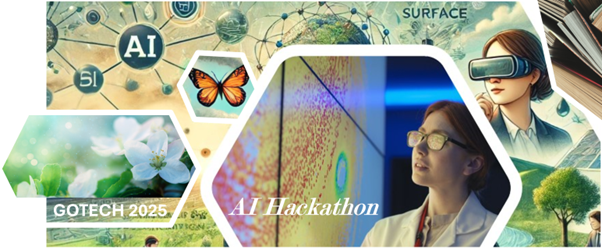
Event Overview
The AI Hackathon II is the second iteration of our highly successful AI Hackathon series, organized as part of the GOTECH 2025 conference under the SPE sponsorship. This event fosters innovation, collaboration, and advanced problem-solving in artificial intelligence. The 2025 theme, "AI Surface Network Production Flow Behaviour Prediction and Optimisation," will challenge participants to develop cutting-edge AI solutions to open new dimensions in surface network production of the E&P sector.
Submission Deadline: 01 March
Technical Topics to Cover
Theme: AI Surface Network Production Flow Behaviour Prediction and Optimisation
-
Surface network production flow behaviour in the oil and gas industry is a complex system influenced by many factors, including fluid properties, pipeline configurations, and operational conditions. The theme for AI Hackathon II revolves around the application of AI to predict and optimise this behaviour, focusing on the following:
- AI Flow Prediction Model: Using historical data inputs (of four months of production), develop AI models that accurately forecast production flow (of subsequent two months) under varying events and activities in the field.
- Total Flow Rate
- Oil Flow Rate
- Water Flow Rate
- Gas Flow Rate
- GOR
- Pressure
- Temperature
- AI identification of the reasoning for decline:
- Predict the potential reasons that caused the change in production in the last two months by learning from the first 4 months' data. Identify the strings that are suffering from these changes in production.
- AI Production Optimisation Model: Creating algorithms that can optimize flow rates (increasing), reduce bottlenecks, and maximize efficiency in surface network operation activities.
Purpose and Objectives
-
The primary purpose of AI-Hackathon-II is to provide a platform for industry professionals, academic faculty and students, and AI enthusiasts to collaborate on complex challenges in the E&P sector, specifically focusing on:
- Innovation in AI Applications: Encouraging the development of novel AI-based methodologies and tools that can accurately predict and optimize surface network production flow behavior.
- Knowledge Sharing: Facilitating the exchange of ideas, techniques, and best practices among participants from various disciplines, including data science and engineers and scientists from all disciplines.
- Industry Advancement: Contributing to the E&P by delivering tangible, AI-driven solutions that can enhance operational efficiency, reduce costs, and improve safety in surface network operations.
- Networking and Collaboration: Building a strong network of AI professionals, researchers, and industry experts who can continue to collaborate beyond the hackathon to push the boundaries of AI in the energy sector.
Hackathon Structure
AI-Hackathon-II will be structured to maximise participant engagement and innovation output through the following phases:
Registration and Team Formation:
- Participants register as individuals or teams (maximum of 5 members per team).
- Cross-disciplinary team formation is encouraged to combine AI expertise with domain-specific knowledge. And they can be from multiple institutions and individuals.
- Create a team name that you will enter in the submission form, even if the team comprises one person. (Note: Try to make it a unique and with a special name).
Problem Statement Release:
- A detailed problem statement aligned with the theme will be released at the beginning of the hackathon.
- Participants will have access to relevant datasets to develop their solutions.
Workshops and Mentorship:
- A series of pre-hackathon workshops will be conducted to familiarise participants with the objectives and data.
- Mentors from academia and industry will be available throughout the event to guide teams and provide technical and strategic advice.
Development Phase:
- Participants will have three months to develop their solutions.
- Continuous support will be provided through dedicated communication channels, like FAQ, email, etc.
Submission and Evaluation:
- Solutions will be submitted as a working prototype or model, with a technical report, data, and a presentation. The Report has to be in the form of a Technical Paper, where all the team members must be listed as authors and co-authors and. Also, to honor the efforts of the AI-Hackathon Committee members in formulating the problem and guiding through the solutions in emails, workshops, FAQs, and then testing the models, they are considered co-authors.
- The AI Hackathon Committee, comprising AI experts, industry leaders, and academics, will evaluate the submissions based on the criteria.
Final Presentations and Awards:
- Selected teams will present their solutions in a final round during the GOTECH 2025 conference.
- Awards will be given to the top-performing teams.
- The prize is a Trophy and certificate, while only students from the winning teams will get other physical reward).
-
(Note: For the winning team, only the students will get the Ticket and Hotel paid by the GOTECH 2025 conference.)
-
Evaluation Criteria
- Mean Absolute Error (MAE): MAE is calculated as the average of the absolute errors between predicted and actual values. The error is the difference between the actual value and the expected value. Therefore, MAE would be considered the primary criterion for ranking the models. Also, Root Mean Square (RMS) would be considered as an additional criterion where we encourage participants to report it also.
- Model Learning Time: This is the time needed to train a model on the training data set. Model Run Time is the second criterion when two algorithms deliver the same MAE. Therefore, it might be used in the MAE tie between different participant models.
- The ability to solve all the problems of all the wells and the dependent parameters, or not.
Code of Conduct
AI Hackathon II is committed to fostering an inclusive and respectful environment. All participants are expected to adhere to the following principles:
- Integrity: Maintain honesty and transparency in all aspects of the competition.
- Respect: Treat all participants, mentors, and organizers respectfully and courteously.
- Collaboration: Encourage teamwork and knowledge sharing within and across teams.
- Professionalism: Demonstrate professionalism in conduct, submissions, and presentations.
Additional Notes for Responding
Once a participant submits the application form and downloads the data, another email will be sent to the participant after a few weeks with a link where the participant should:
- Upload the AI Models. The models must be in a format that can run in a Python IDE or Python compiler; therefore, all the dependent libraries (requirements.txt file) to run the model must be provided.
- Upload the prediction work report (the report should contain the following sections [Title, Participants and Affiliation, Abstract, Introduction, Method, Results, Discussion, Conclusion].
- Upload the input/output data of blind data set prediction used in the prediction in an xls sheet. Make sure that you provide unscaled results.
- All the data, models, and reports should be included in one zip file following this file naming format: [“Team Name”-“MMM-DD”-GOTECH2025AIHackthon.zip].
Contacts
For any additional information or query, please contact:
Gehan Megahed gmegahed@spe.org
Omar Alfarisi oalfarisi@dragonoil.com
Muhammad Gibrata mgibrata@dragonoil.com
Maryam Dashtebayaz mdashtebayaz@dragonoil.com
Links
- Application Form: Please use this form to submit your application. Once you click submit, a new page containing the link to download the data will appear. https://forms.office.com/r/QRa7aL1kgN
- Upload Response: please use this link to upload your final response in one zip file as mentioned in the Additional Notes for Responding section.
AI Hackathon II Committee
Omar Alfarisi
Senior AI Technology Advisor
Dragon Oil
Chair
Hamid Abderrahmane
Associate Professor
Khalifa University
Champion
Rashid AlJarwan
Senior Operations Support Engineer
Dragon Oil
Champion
Mohammed Saad Al Kobaisi
Associate Professor
Khalifa University
Champion
Jasem AlMansoori
Reservoir Engineer
Dragon Oil
Champion
Emad Walid Al Shalabi
Associate Professor
Khalifa University
Champion
Mahra AlZarooni
Drilling Engineer
Dragon Oil
Champion
Jian Hou
Dean of Petroleum Engineering
China University of Petroleum (East)
Champion
Hadi Belhaj
Associate Professor
Khalifa University
Champion
Maryam Dashtebayaz
Lead Simulation Engineer
Dragon Oil
Champion
Magdi ElDali
Senior Geologist
Dragon Oil
Champion
Fadi Fahmy
Senior Equipment Drilling Engineer
Dragon Oil
Champion
Muhammad Gibrata
Senior Petrophysicist
Dragon Oil
Champion
Alaa A. Hassan
Data Analytics Specialist
Dragon Oil
Champion
Hossein Hejazi
Professor
University of Calgary
Champion
Zeyar Aung
Associate Professor
Khalifa University
Champion
Qingfeng Huang
Senior Reservoir Simulation Engineer
Dragon Oil
Champion
Mohamed Ibrahim
Petroleum Engineer
Dragon Oil
Champion
Amir AlAmeeri
Senior Flow Assurance Engineer
Dragon Oil
Liming Zhang
Professor
China University of Petroleum (East)
Champion
Saif Ur Rehman
Engineer
Champion
Lamia Rouis
Manager Reservoir
Dragon Oil
Champion
Rohit Singhal
Senior Drilling Database Planning Engineer
Dragon Oil
Champion
Izwan Adnan
Senior Reservoir Simulation Engineer
Dragon Oil
Xiaopu Wang
Associate Professor
China University of Petroleum (East)
Champion
Bicheng Yan
Assistant Professor
King Abdullah University of Science and Technology
Champion
Jun Yao
Professor
China University of Petroleum (East)
Champion
Yongfei Yang
Professor/Vice Dean
China University of Petroleum (East )
Champion
Kai Zhang
Professor/President
Qingdao University of Technology
Champion
Furat AlObaaidi
Lecturer
University of Michigan
Champion
Azwan Maoinser
Senior Lecturer
Universiti Teknologi Petronas
Vasudev Menon
Freelancer


